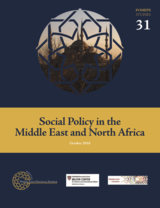
Social insurance reforms in Egypt: needed, belated, flopped
Loewe, Markus / Lars WestemeierExternal Publications (2018)
in: Social Policy in the Middle East and North Africa (POMEPS Studies 31), 63-69
Most governments in the Middle East and North Africa spend considerable shares of GDP on their social insurance and transfer schemes but these perform poorly in terms of efficiency, equity and sustainability. Nevertheless, until recently, no country in the region has embarked on systemic reforms. The last Egyptian government under President Mubarak (2004-2011) drafted concrete plans to reform social health and pension insurance but these were heavily criticised by NGOs and therefore finally revoked. President Sisi in contrast was able to push through at least a social health insurance reform. The question is thus why the Egyptian government – despite its authoritarian character – did not dare for long to embark on social policy reforms and why NGOs could obstruct the reforms that the government had finally worked out in the late 2000s – while President Sisi faced only limited resistance and brought at least public health insurance reforms on their way. The article argues that social policies are a sensitive policy field even for authoritarian regimes – in particular if these legitimise their rule by their performance in social and economic development (such as in Egypt under President Mubarak) rather than just stability and security (such as in Egypt under President Sisi).

